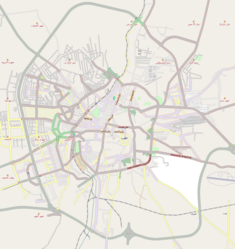
Summary
Beit Achiqbash (Arabic: بيت أجقباش في الجديدة); (Bait Achikbache House, Bayt Ajiqbash, Maison Ajikbash) is an old Aleppine courtyard mansion built in the mid 18th Century by Qarah Ali (Karaly), a wealthy Christian merchant.[1][2]
| Beit Achiqbash بيت أجقباش في الجديدة | |
|---|---|
 Achikbache House and Courtyard in Aleppo, 2001 | |
| Location | Al-Jdayde, Aleppo, Syria |
| Coordinates | 36°12′21.79″N 37°09′23.69″E / 36.2060528°N 37.1565806°E |
| Built | 1757 |
| Architectural style(s) | Ottoman |
| Governing body | Directorate-General of Antiquities and Museums |
| Owner | Government of Syria |
 Location of Beit Achiqbash بيت أجقباش في الجديدة in Aleppo | |
Background edit
Beit Achiqbash is one of a number of historic buildings found in the Al-Jdayde Christian quarter of Aleppo.[3][4] It was built in 1757 CE. A Turk named Ashiqbash later bought the house after the Karaly (Qara Ali) moved to Alexandretta.[2][4]
The house is famous for its courtyard, which is extravagantly decorated in a Mamluk-Rococo style. The building was turned into a museum in 1973 and restored in the 1980s. It is well known for the fine carved ornaments that decorate its courtyard.[5][6] Its style is said to have been greatly influenced by Baroque decorative traditions.[7] The rooms on its eastern side were eliminated to make way for the street that now runs in front of the property.[8]
Beit Achiqbash remains the home of the Popular Traditions Museum with its collection of fine decorations of Aleppine art along with artefacts of past local lives.[9][10]
Recent Developments edit
The building, like much of Aleppo's old city,[11] suffered "severe" damage and looting caused by street fighting during Syria's civil war.[8][12][13]
A survey of Beit Achiqbash was completed in November 2017 by the Directorate-General of Antiquities and Museums and UNESCO to facilitate emergency consolidation of its structure.[14][15][16]
Consolidation work on the structure began in 2019. As of August 23, 2021, restoration and construction work took place in the courtyard, including sculptural work, restoration of facades using original elements such as old chasuble stones. The second phase of the restoration was completed on September 2, 2021. The main architect of the entire reconstruction is Eng. Pierre Ghassan Zarz.[17]
Further reading edit
- Salle, Eusèbe de, (fr:Eusèbe de Salle) (1840) Pérégrinations en Orient, ou Voyage pittoresque, historique et politique en Égypte, Nubie, Syrie, Turquie, Grèce pendant les années 1837-38-39. T. 2 , Pagnerre (Paris) p. 194-200. (in French)
- Burns, Ross (2018) Aleppo: A History Cities of the ancient world. London; New York: Routledge
- Beit Achiqbash - Alep, Syrie - relevé 3D et nuage de points (mission UNESCO)
Gallery edit
-
Interior of Beit Ajikbash (2001)
-
Interior of Beit Ajikbash (2001)
-
Interior of Beit Ajikbash (2001)
-
Beit Ajikbash Museum of Aleppo (2010)
-
Beit Ajikbash Courtyard (2010)
-
Beit Ajikbash Iwan (2010)
-
File:Beit Ajikbash survey (2016)
-
Beit Ajikbash photograph taken during damage survey (2017)
-
Beit Ajikbash photograph taken during consolidation work (2019)
See also edit
- List of museums in Syria
- Ancient City of Aleppo
- Jdeideh (Aleppo)
- Archnet MIT Documentation Center Document Building Style: Ottoman
- Aga Khan Documentation Center Bayt Ajikbash Archive
- Beit Ghazaleh
- UNESCO UNITAR 2018 report on Aleppo old city destruction
References edit
- ^ Aga Khan Documentation Center available on http://www.archnet.org/library/sites/one-site.jsp?site_id=4806 Archived 2012-09-01 at the Wayback Machine Accessed 2017-01-01.
- ^ a b UNESCO (17 August 2016). "ASOR Cultural Heritage Initiatives (CHI): Planning for Safeguarding Heritage Sites in Syria and Iraq" (PDF). en.unesco.org. p. 21.
- ^ Darke, Diana (2010-01-01). Syria. Bradt Travel Guides. ISBN 9781841623146
- ^ a b Salle, Eusèbe de (1796-1873) Auteur du texte (1840). Pérégrinations en Orient, ou Voyage pittoresque, historique et politique en Égypte, Nubie, Syrie, Turquie, Grèce pendant les années 1837-38-39. T. 2 / par Eusèbe de Salle,... (in French). Paris. pp. 195–200.
{{cite book}}: CS1 maint: numeric names: authors list (link) - ^ MIT Libraries special collections (1983) Aga Khan Visual Archive: Achik Bash House photographs available on http://hdl.handle.net/1721.3/75636
- ^ "Aga Khan Documentation Center Bayt Ajikbash Archive". Archnet. Archived from the original on 2016-04-28. Retrieved 2021-10-03.
- ^ Aleppo : a history / Ross Burns. - Princeton University Library Catalog. p. 250. ISBN 9780415737210. Retrieved 2017-03-23.
{{cite book}}:|website=ignored (help) - ^ a b UNESCO [49267]. "Five years of conflict: the state of cultural heritage in the Ancient City of Aleppo; A comprehensive multi-temporal satellite imagery-based damage analysis for the Ancient City of Aleppo". unesdoc.unesco.org. pp. 96–99. Retrieved 2019-07-22.
{{cite web}}: CS1 maint: numeric names: authors list (link) - ^ Burns, Ross (2009-06-30). Monuments of Syria: A Guide. I.B.Tauris. ISBN 9780857714893.pp.52-54
- ^ "Bayt Ajikbash | Archnet". archnet.org. Retrieved 2018-02-12.
- ^ Richard Spencer, Hannah Lucinda-Smith (December 22, 2016). "Struggle begins to restore glory of Aleppo". www.theaustralian.com.au. Retrieved 2017-05-20.
- ^ Directorate of Antiquities and Museums of Aleppo(2016) "Photos of Damage of Traditional Art Museum, Dar Ghazaleh, and Jdaideh in old Aleppo", Available on http://www.dgam.gov.sy/index.php?d=314&id=2159 Published on 2016-12-22, Accessed 2017-01-01
- ^ "Aleppo's famed Old City left 'unrecognisable' by war". Al-Monitor. Available from http://www.al-monitor.com/pulse/afp/2016/12/syria-conflict-aleppo-heritage.html 2017-01-01. Retrieved 2017-01-01.
- ^ Art Graphique & Patrimoine (2017-11-28), Relevé et nuage de points de Beit Ghazaleh, Alep - Syrie, retrieved 2018-02-12
- ^ "Beit Ghazaleh, Alep - Syria". AGP. Archived from the original on 2018-02-13. Retrieved 2018-02-12.
- ^ Art Graphique & Patrimoine (27 Apr 2018). "Beit Achiqbash - Alep, Syrie - relevé 3D et nuage de points (mission UNESCO)". www.youtube.com. Retrieved 2019-01-16.
- ^ Othman, Nisreen (23 August 2021). "Restoration acts of Museum of Popular Traditions in Aleppo continue with high pace". Syrian Arab News Agency. Retrieved 4 September 2021.


